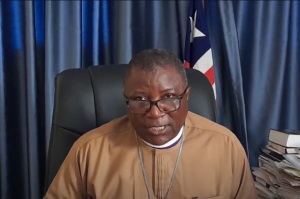Atheists in Military Seek Recognition to Minister to Troops
As members of the military come up with ways to cope with the realities of war and face the wreckage it can cause in one's psyche, who or what can they turn to? In the case of a self-proclaimed atheist, it is not God.
One atheist, Capt. Ryan Jean, told the Baltimore Sun about his views as an atheist and how an Army chaplain berated him for not believing in God.
Jean says experiences such as that confrontation three years ago, when he was serving at Camp Arifjan in Kuwait, have spurred him to seek Army recognition as a humanist lay leader - on a par with the lay Christians, Jews and Muslims who help military chaplains.
Albeit a far-reaching idea, the appeal has been gaining traction. According to the Baltimore Sun report, as much as a dozen U.S. military atheists are applying for the status, "which they and their supporters see as necessary to secure for nonbelievers the acceptance and support that they say Christians in uniform take for granted."
"What I've heard is, 'Well, you guys aren't like us. You guys don't believe like we do,' " Jason Torpy, the former Army captain who heads the Military Association of Atheists and Freethinkers, told the Baltimore Sun. "What I haven’t heard is, 'Yes. We accept.' "
The military does not recognize atheists or humanists as members of an organized religion. Atheists do not believe in a god. Humanists typically are nonbelievers who find meaning in ideas about community, science and human potential. There is much overlap between the two groups.
In practical terms, Jean told the Baltimore Sun, lay leader status would make it easier for atheists at Fort Meade to get access to facilities and services on the base. But he says recognition would carry a larger message.
"It shows that we're not going to be silent and go away," he said. "It shows that we are a community with real needs. It shows that the chaplaincy by its very nature is not meeting those needs - and, I would argue, is inherently incapable of properly meeting those needs without some sort of liaison."
The Army Times shared the Baltimore Sun report with its readers, who offered mixed reaction to the move by atheists soldiers to be allowed minister to other non-believing military members.
Christopher Berge wrote, "It's funny how atheist take for granted their 'inalienable rights' that are protected under the Declaration of Independence that are 'endowed by a creator'. If there is no creator then where do your rights come from? Other men? It's philosophy like this that turns the US into a third world country."
Sephiroth Shamshan Kali, who identified himself as a member of the United States Marine Corps, wrote, "I sympathize with him for the discrimination against atheism, but there is an obvious problem. A Lay Leader is a member of the laity, a member of a religious order. Atheism, while a valid belief system is not IMO, a religious order, as there is no religion."
Chris Herr, of Yuma, Ariz., responded, "Just because atheism isn't a religion, doesn't mean an atheist doesn't too have psychological, moral, or personal needs for counsel that would be best served by a non-religious counselor."
Herr added, "The Chaplaincy does a decent job giving secular counsel, but there are far too many slips and implications that the only solutions to our problems are through faith or 'spiritual wellness', as the Army program puts it. It's a whole paradigm shift of thought that doesn't sit well with most non-theists who are seeking guidance from a religious figurehead."





























